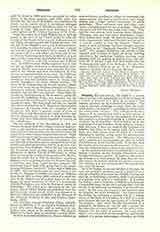

Pension, ECCLESIASTICAL, the right to a certain sum of money to be paid yearly out of the revenues of a church or benefice to a cleric, on account of just reasons approved by an ecclesiastical superior. The term is derived, according to some, from the Latin word pendeo, “to depend”; according to others, from the word pendo, “to pay”. The term pensio is sometimes used as synonymous with a certain species of benefice, as when a cleric, by the authority of a superior, receives a perpetual vicarship in a church and is sustained by its revenues. This is looked on as the conferring of a real benefice. In its ordinary acceptation, however, it does not connote the bestowal of a benefice, but refers to the money paid, for a certain time, to a third person from the fruits of a benefice belonging to another, acting under the authorization of an ecclesiastical superior. The obligation to pay such a pension may be incumbent on either the holder of a benefice or on the benefice itself. If the first, then the burden does not pass to his successor; if the second, the obligation lasts as long as the pensioner lives.
As the pope has full power over all benefices, he may impose a pension on any benefice whatsoever, even though it belong to a patron. If, however, the patronage belongs to a royal person, the pope does not usually impose the pension without the patron’s consent. For validity, it is not necessary that the pontiff give any cause for his act.
As to the bishop, or anyone inferior to the pope, he may not, generally speaking, impose a perpetual pension on a benefice or increase one already existing, nor may he, in conferring a benefice, make a reservation of a pension to be paid to a third party. It is within the bishop’s power, however, to impose a pension, for a reasonable cause, to last for a certain time, even for the life of the holder of the benefice, if he himself consents. In this case, the pension is not imposed upon the benefice, but on its incumbent. The canons forbid the bishop to constitute a pension out of a certain quota of the fruits of a benefice, as a half or a third part, because this has the appearance of a division of the benefice. Just causes for the constitution of a pension by the bishop are: for the sake of peace; for the education of a poor student; for the utility of the Church; for the relief of paupers; for some pious object; for a reward of services rendered; and for the support of a person who resigns a benefice, in which fast case it should be in moderate proportion and not the result of a bargain. For the causes mentioned, a bishop may not impose a pension on a benefice itself, or to have effect after the decease of the incumbent, though some canonists have maintained the contrary. When a bishop confers a benefice, he is not allowed to burden its collation with a pension to be paid to himself, as this would be a simoniacal transaction.
When two beneficiaries interchange benefices, they may not make a pact by which the one receiving the richer post is to pay a pension to the other, but the bishop may make such a stipulation of his own free will on the occasion of the exchange of two beneficiaries. In like manner, while it is simoniacal for an abdicant to stipulate for a pension out of the benefice he resigns, yet he may, for grave cause, request the bishop to give him such a pension, and the bishop may bestow it upon him. Simoniacal pacts are those which are made without the intervention of the proper ecclesiastical authority.
Laymen are incapable of receiving ecclesiastical pensions, and the clerical recipient must not be excommunicate, suspended, or under interdict. Pensions may be transferred to another by the pensioner, if the proper authority sanctions it. The earliest mention of a pension in Church history is said to be that of Domnus of Antioch, who received one out of the revenues of the bishopric, which he had vacated at the time of the Council of Chalcedon in 451.
WILLIAM H. W. FANNING

